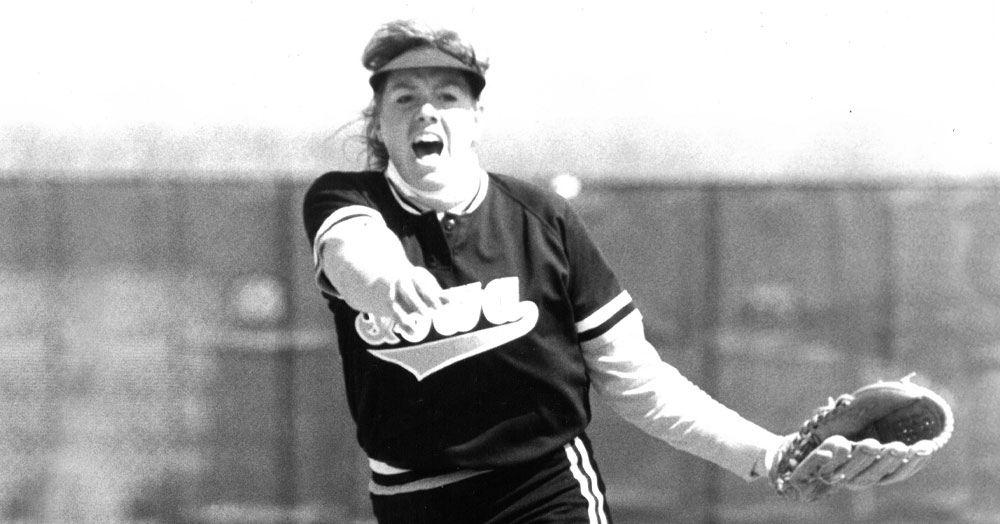Iowa Athletics Hall of Fame
Terri McFarland (92BBA)
Terri McFarland wasn’t sure she was going to play softball in college.
A visit with two legends in Iowa’s athletic department changed her mind.
For McFarland, her induction into the UI Athletics Hall of Fame is a credit to her coaches and her teammates. But she also credits coach Gayle Blevins and women’s athletic director Dr. Christine Grant (70BA, 74PhD) with helping her make the final decision to come to Iowa from California.
“It was an exciting time because I was in Coach Blevins’ first recruiting class,” McFarland says. “I wasn’t going to play softball in college—I always wanted to go to a big school, and there weren’t as many programs as there are now. I was limiting myself completely, and I wasn’t going to play college softball.
“Then Coach Blevins came along, and she had such credibility with what she had done at Indiana (where she won three Big Ten titles and finished third in the Women’s College World Series). And then I met Dr. Grant on my recruiting trip, and she was such a force.”
Blevins and Grant, McFarland says, made her confident in how Iowa’s softball program could grow.
“I knew what our program could do,” she says. “The women’s basketball team had sold out the arena. The field hockey team was great. I knew our program would do that, because Dr. Grant had so much faith in Coach Blevins, and the resources and the support were there.”

PHOTO: HAWKEYESPORTS.COM
McFarland, a pitcher, was the Big Ten’s freshman of the year in 1989. A year later, she was the conference’s player of the year. McFarland was part of two Big Ten championship teams and played on two teams that made it to the NCAA tournament.
Her individual numbers were impressive—she still ranks first in career shutouts (50), second in ERA (0.82), third in complete games (104) and innings (901.1), fourth in appearances (158), fifth in strikeouts (791) and sixth in wins (88). McFarland holds single-season school records in appearances (57), innings (302) and complete games (35), while ranking second (18), fourth (14) and sixth (12) in shutouts, third (0.53), eighth (0.75) and 10th (0.83) in ERA, eighth in wins (27) and ninth (241), 14th (199) and 15th (198) in strikeouts.
“I remember game results, but I don’t remember a lot of the games,” McFarland says. “It was such a great feeling to win the Big Ten my first year there. The team went from .500 to winning the Big Ten, and then getting to the (NCAA tournament) and hosting the regionals. We were always on the edge—the two years we didn’t go to the NCAA tournament, we were close.”
McFarland may have grown up in California, but she was quite familiar with the Big Ten. “My parents were from Ohio, and so I was an Ohio State fan,” McFarland says, adding with a laugh, “But to me, the Big Ten was Ohio State and Michigan.”
She made her impact on the conference as a four-time All-Big Ten selection and a member of the conference’s All-Decade team.
“It’s everything,” McFarland, now an attorney living in California, says of her time with the Hawkeyes. “It made me confident in whatever I did. I never stopped working. Being a part of that, being a teammate, that has helped me be a lawyer. I work well with others. Being a pitcher is a little more on your own. But I can support teammates and be supported by teammates.”
—JOHN BOHNENKAMP
